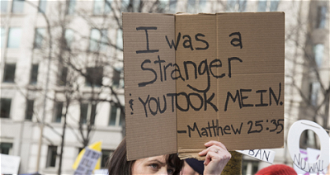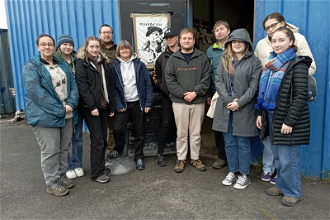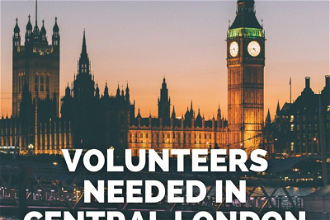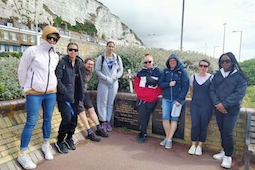Calais: Situation 'desperate' three years since destruction of 'Jungle'

Three yearsafter the demolition of the makeshift refugee camp 'the Jungle' in Calais, migrants continue to arrive on the north French coast, and find even less support than they received in 2016.
Bishop William Nolan of Galloway, President of Justice and Peace Scotland, has expressed concern at the ongoing situation at the UK border. Bishop Nolan said: "Three years ago the French and UK governments demolished the refugee camp known as 'the jungle'. Many thousands of people were dispersed across France, and the infrastructure of support and solidarity provided by so many volunteers was destroyed. Three years on the situation in Calais, Dunkirk and other areas is more desperate than ever. The policies of attrition - wearing down refugees through harsh treatment, including eviction from places of shelter, confiscation of possessions, assault and use of pepper spray - are forcing already vulnerable people to increasingly desperate measures, pushing them into the arms of people smugglers and human traffickers. Human rights activists helping refugees are also being harassed: the women and men who continue to travel to Calais and other areas as volunteers, distributing aid, food, and accompanying their brother and sister refugees in friendship and support. It is shameful that this is happening with the knowledge and financial support of the UK government. When I visited Calais in 2017, just over one year after the jungle had been demolished I witnessed the situation of many young refugees sleeping rough, and in the statement we issued called on the authorities 'to recognise that these are our fellow human beings, regardless of their [immigration] status, and that their intrinsic dignity must be upheld.' Now, three years since the jungle was destroyed, with no progress being made, I once again join the calls made on our government that safe and legal routes must be established, and that an infrastructure which allows for dignified living for those in Calais must be a priority".
Bishop Nolan's remarks come after a year when Amnesty International reported on the "unprecedented restrictions, including threats and violence, denunciation in public discourse, and criminalization" being faced by volunteers and staff in northern France. Their report 'Targeting Solidarity' documents the increasingly hostile tactics being used against volunteers from a range of organisations in France who are filling the gap left by the state for providing food, clothing and medical care. Amnesty International makes the point that the 'work of human rights defenders in the area is inextricably linked to the treatment of people on the move. It is therefore paramount to end the human rights violations faced by this group'. Amnesty repeated the calls made by NGOs and Bishop Nolan that this 'requires that France ensures its asylum and reception system is fit for purpose; that the UK increases the number of refugees and asylum-seekers it currently accepts by providing safe and legal routes'.
Building from the bishop's visit in 2017, Justice and Peace Scotland has continued to highlight the situation in Calais, and in early 2019 as part of a project called 'Encounter: Calais' two groups of volunteers travelled down to Calais, volunteering with Care4Calais, one of the volunteer aid organisations and meeting the community at Maria Skobtsova Catholic Worker House which had hosted Bishop Nolan in 2017. Frances Gallagher from St. Mungo's, Bishopbriggs, who was one of the volunteers was asked about her thoughts said:
"Since my visit to Calais in February of this year, from time to time, out of nowhere, I find myself wondering how the man I saw shivering without a coat in the car park at the Dunkirk distribution point is? Or how the young man with no socks on, whose shoes had burst along one side, is? I remember how everyone queued eagerly for hot tea, and as they picked up their tea and turned to leave I had the task of spooning sugar into their tea. They all said the same thing to me "more" some asking for as many as six or seven spoons of sugar in a small white plastic cup of tea. The reality of life as a refugee in Calais was shocking to me at the time and still haunts me now but the thing that made it all hit home was an innocuous conversation with Elena. Elena was a lovely young girl from London who travelled to Calais to volunteer with Care4Calais as often as she could. She would take her bike on the channel tunnel train as a foot passenger and get off the train at Calais and cycle to the local YMCA where she stayed whilst she volunteered - £10 - she told me, I remember saying "sorry", again she repeated it, 'it costs me £10 to come here'".
Danny Sweeney, Justice and Peace Scotland's Co-ordinator who led the visits to Calais commented: "The last couple of times I've been in France it is noticeable that volunteers are now being harassed by the police along with the refugees. When I went to Dunkirk with Care4Calais our vehicle was stopped, we were all ordered to handover IDs they were checked, we were questioned about our activities. Luckily it didn't go any further, but there are reports of volunteers being detained for several hours by the police. Their pretence, the same type of language we hear from our government, is concern about trafficking. It suits their agenda to paint all volunteers as potential criminals and the authorities as "protecting" the refugees. Anyone who has been there knows just how ridiculous this is."
Danny Sweeney continues to raise awareness about the situation in Calais as part of his work for the Scottish Bishops Conference, regularly speaking in school assemblies, classrooms and to church groups across Scotland about the situation on the ground, and Justice and Peace Scotland's 'Encounter: Calais' project.
"The instruction in scripture to welcome the stranger is repeated more often than any other, and it is given new meaning when you are reflecting on this in a place where you are face to face with those who are the "stranger". With Encounter: Calais we wanted facilitate volunteering and use that experience to feed and challenge our faith spending time reflecting on what this situations mean for us as Christians, as people who are commanded to welcome others, and to do it with those times spent at the warehouse and the distribution lines each day as we go through that process."
Since the Encounter: Calais volunteers returned earlier in 2019 and interest in the situation has only grown. In a couple of weeks Danny Sweeney is going with a group of volunteers from England who contacted Justice and Peace Scotland the day after he returned in February.
"We got a call from a group of friends connected with the Columban Missionary Society and we're really pleased to see that our Encounter: Calais project has inspired others. While there's lots of support and interest from churches across the country for groups in Calais there is nothing similar to what we did coming from the English & Welsh Church; seeking to connect members of the Catholic community with the situation. This is one of those issues which we deal with at a UK level, so it's great that we can support our brothers and sisters south of the border as they develop this work."
Volunteers who are in Calais long term have reported that the situation is very changeable, and dependant on the activities of the authorities across Europe. Alex Holmes, a Scottish volunteer with Maria Skobtsova Catholic Worker House, reported that they have seen fewer people coming to Calais from crossing the Mediterranean but increasing numbers who have been refused protection in other countries, and some who have been removed by the UK. There are even more fears for the future. Recent comments by the government about returning those who cross the Channel in small boats, and pledges to withdrawn from international agreements have volunteers worried.
Danny Sweeney says: "When the government talks about returning those who cross the Channel to France what they are really wanting to do is suspend elements of the Refugee Convention, the agreement which was established in 1951 to provide a framework to respond to the mass displacements which had taken place following World War Two. The Refugee Convention recognises that people fleeing persecution may not have the documents or option to cross international borders legally. For the UK government to be picking and choosing which bits of the law suit them is a dangerous precedent to be seeing. The talk of withdrawing from family reunification agreements in the Dublin III Regulations is equally worrying. Currently if a child is alone in Europe, for example Italy or Greece, but has parents in the UK we recognise the sanctity of the family and act to reunite that family. Without these agreements we risk seeking a significant increase in the number of unaccompanied children trying to cross Europe. They will be more vulnerable to exploitation, and many will end up in Calais, and facing the brutality of the authorities there will inevitably increase."
Clare Mosley, the founder of Care4Calais, recently updated Justice and Peace Scotland saying: "In the last month we have seen a major clearance in Calais, with the biggest site in Calais fenced off, people arrested and bussed out, and tents and possessions destroyed. This was followed by over two weeks of general harassment. No matter how sparse or desolate the place where people tried to sleep, the police moved them on. People are left tired, confused and not knowing which way to turn.
We have also seen the closure of the gym in Dunkirk where approximately 600 people, including many families, had been living for the previous eight months. Again, people were put on buses for reception centres around France but already nearly 300 have returned to sleep rough in the surrounding area. This gym was not designed to provide sleeping for 200 people inside and 400 outside, or toilets and showers for 600 people in total. But it was still a lot better than just sleeping rough."
The above actions are the result of a political need to 'take action' as our government believes the UK is facing a national 'crisis' - 1000 migrants have crossed the Channel in boats this year. Perhaps a bigger issue is that 1% of our population owns 50% of our land.
This strategy of continual forced evictions has been followed for many years now - certainly enough to clearly demonstrate it is a pointless exercise. Evictions have no effect on the underlying issues that cause people to risk their lives on dangerous journeys to the UK; even the major destruction of the Calais Jungle in October 2016 did not change this.
What does happen is that some of the most vulnerable people in society - people who are already severely traumatised, who don't have the protection of the law, people who have done nothing wrong but are desperate to protect their families and have the audacity to ask for our help - are further abused and sacrificed.
With two major evictions the need for sleeping bags and tents is higher than ever before.
Details of how to donate money, and the map of drop off points for donations can be found on the Care4 Calais website.
As part of highlighting the anniversary of the jungle's demolition and the ongoing situation, Justice and Peace Scotland has compiled a list of resources, bringing together news articles, reports, and videos which capture some of the history and the issues around the jungle and recent years.
Danny Sweeney said: "The movement of people that we've seen in recent years is probably the first mass movement when people have been connected digitally in this way. There aren't just professional TV crews filming it, but volunteers and refugees able to document what they are seeing and doing. In the year or so that the jungle was standing thousands of people came together, and some of the stories were recorded and shared. Later when the jungle was destroyed and since then everything has been captured so people can learn about it first-hand. The resources which we have pulled together capture a small proportion what is out there, but can be used by people in church and school communities across Scotland to learn a bit more about what did happen with the jungle three years ago, and what is still going on today."
The resource sheet is available on Justice and Peace Scotland's website www.justiceandpeacescotland.org.uk





















